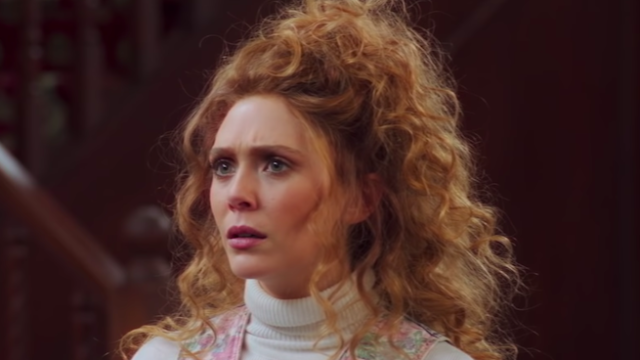WandaVision hit a major turning point last week when it showed the state of the larger Marvel Cinematic Universe outside of Westview, New Jersey by looking back on how Monica Rambeau (Teyonah Paris), Darcy Lewis (Kat Dennings), and Jimmy Woo (Randall Park) all came to be involved in the situation. This week’s “On A Very Special Episode” reaffirmed the Disney+ series isn’t going to be letting up anytime soon.
The fifth out of WandaVision’s nine episodes brings a very specific, malevolent energy that’s always been present in the series much closer to the surface in a way that’s reflected both inside and out of the hexagonal anomaly enveloping Westview. As WandaVision’s in-universe show continues to jump through decades on its way to becoming a present-day sitcom, the barrier between Westview and the outside world’s growing even stronger. But as the line between WandaVision’s realities and fantasies becomes increasingly blurred, the show’s trading in some of its whimsy to realise something Vision (Paul Bettany) sagely warned Wanda (Elizabeth Olsen) about herself way back in Captain America: Civil War: the more she shows her power, the more people will fear her.

“On A Very Special Episode” opens on Wanda and Vision both trying and failing to get their newborn twins to sleep, a struggle the two parents are only able to find the slightest bit of joy in until the thing that’s been nagging them both brings the couple to a strange impasse. When Wanda asks Vision to fetch the babies’ pacifiers, she uses the moment when she’s alone with the twins to successfully try using her powers to put them asleep, and it’s unclear whether Wanda’s trying to hide what she’s doing from her husband. When the pacifiers also fail to keep the kids from wailing, Vision comments to Wanda that they might just need to spend more time learning how to deal with their kids who were born just hours before, and when Wanda counters that they might simply need a bit of help, Agnes (Kathryn Hahn) hits the Visions’ doorbell right on cue.
Though all of WandaVision’s episodes have been jam-packed with details alluding to both Marvel’s comics and the classic shows it’s celebrating, this episode feels distinct because of the subtext of Wanda and Vision’s exchanges, and how relatively grounded the now Growing Pains-esque fictional show feels compared to previous episodes. Because Vision’s repeatedly been aware of Westview’s off-ness and attempted to speak with Wanda about it, his reasoning that they need to slow down comes across as his understanding that Wanda is, at least partially, in control. Agnes’ arrival after Wanda’s response reads as her brushing Vision’s advice off in order to keep the show going and avoid addressing the larger issue at hand.
Game as Agnes is to lull the twins to sleep with Buns of Steel, Vision’s reluctance to let her watch the kids isn’t just TV paternal instinct kicking in, but rather Vision fully going off-script to the point that Agnes, stunned, breaks character, and asks a shocked Wanda whether she’d like to do the entire scene over from the top. While WandaVision’s come close to having Wanda and Vision speak frankly about their new lives, the directness Vision comes at Wanda with here is new, and his questions about whether she really didn’t just watch their neighbour acknowledge that they’re living in a TV show would be funny if they weren’t delivered so chillingly.
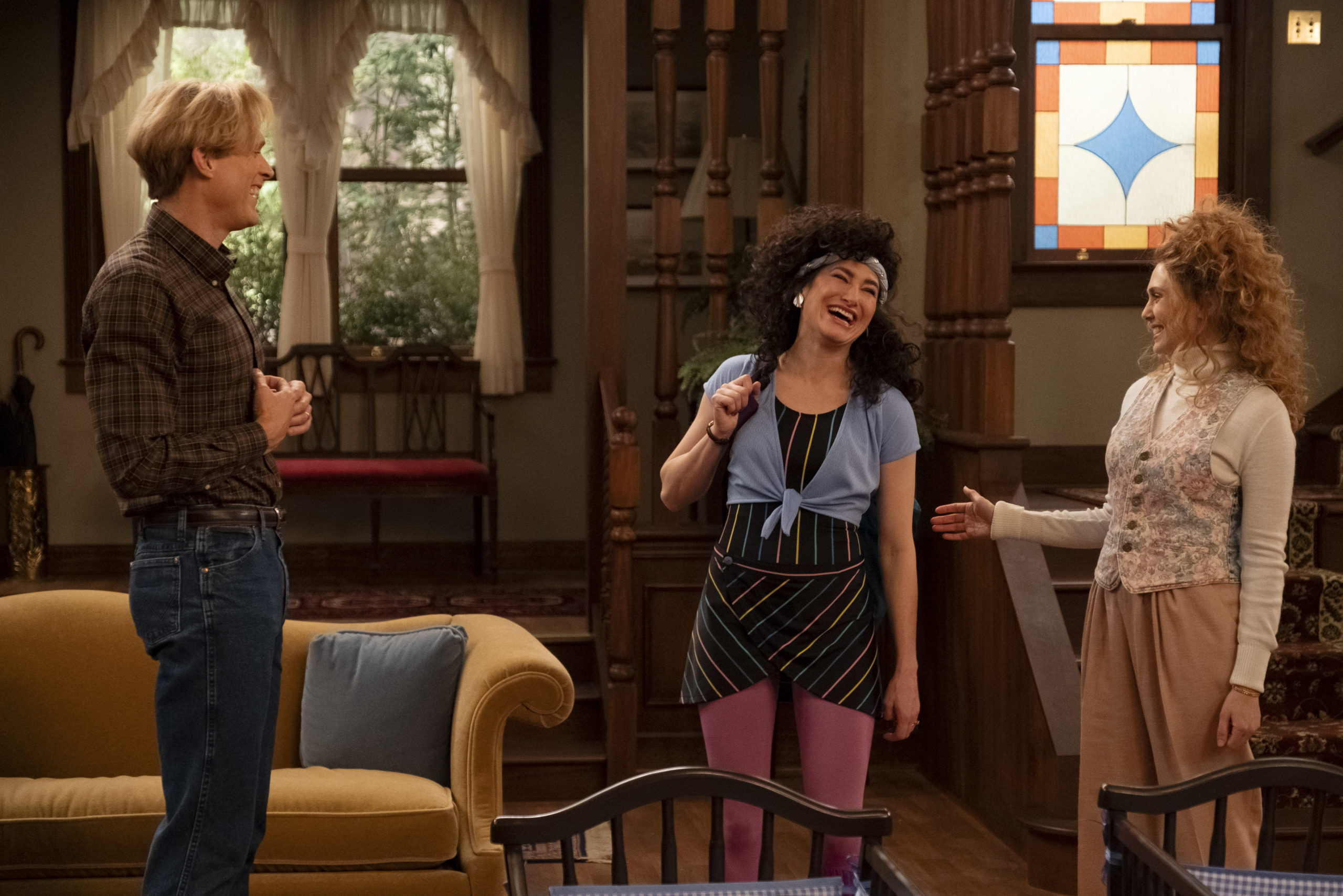
In the West Coast Avengers comics that WandaVision’s drawing from, one of the first signs that something’s amiss with the Scarlet Witch is the way her sons keep vanishing and reappearing suddenly while under the care of various nannies. The reason behind this is eventually revealed to be that, because Billy and Tommy were manifestations of Wanda’s will and magic, they’d stop existing in moments where her mind was preoccupied with other things like Avenging with other superheroes. While Billy and Tommy also disappear and reappear in WandaVision just in time to distract Vision from confronting Wanda, they’re brought back as young, but still drastically different, children than they were moments before, and you can see how, in a way, both the MCU and the comics’ versions of the characters are serving similar narrative purposes.
The theme song that opened the in-universe show this time is many shades more menacing than ABC’s Growing Pains, but it perfectly captures the dark tone the series as a whole is turning towards, especially for those outside of Westview who now have access to the only living person to make it out of the bubble. The amount of force that Wanda used to fling Monica through multiple walls of a house, clear across the city, and outside of the bubble around Westview should have killed her, but as she comes to in a SWORD observation centre, she’s mostly fine, save for her memories of the mental chaos she experienced while under Wanda’s influence.
As Monica gets right back on her feet ready to join the rest of the team in their continued investigation, a SWORD doctor becomes alarmed when Monica’s scans show up completely blank, suggesting that it won’t be long before she begins developing some version of the abilities her comics counterpart has. Under any other circumstances, or with a less willful person, it’s likely that SWORD would insist on learning more about what Monica’s been through. Now that SWORD director Hayward (Josh Stamberg) has come to the conclusion that Wanda’s is the “principal victimiser” in Westview, however, the division’s focus is put on responding to the sentient weapon it’s observed Wanda to be.
[referenced id=”1669077″ url=”https://gizmodo.com.au/2021/02/these-80s-west-coast-avengers-comics-may-be-the-key-to-solving-wandavisions-mysteries/” thumb=”https://gizmodo.com.au/wp-content/uploads/2021/02/03/mo5jepkv19kf5v0xg0ub-300×198.png” title=”These ’80s West Coast Avengers Comics May Be the Key to Solving WandaVision’s Mysteries” excerpt=”With the Scarlet Witch and Vision’s romantic history in Marvel’s comics being the enthralling, convoluted mess that it is, there was a wealth of source material for WandaVision’s creative team to draw from while conceiving the story for Disney+. Because there’s been relatively little of the Scarlet Witch or Vision in…”]
The conversation that unfolds between Hayward, Jimmy, and Monica in front of their colleagues during a briefing functions as partially a useful, if clumsy, reminder of who and what all Wanda’s general deal in previous films was. Once the throat clearing is out of the way, though, what unfolds is a sharply-written depiction of how the realities of situations involving trauma, abuse, and grief can be warped by people’s perceptions of those involved. Though Hayward may genuinely want to save the thousands of civilians trapped within Westview, his read on Wanda is only shaped by hard, negative aspects of her past — like her involvement with Hydra and her breaking the Sokovian accords alongside Captain America.
The series touches back on the idea of Wanda being a known dangerous quantity by way of a commercial for Lagos-brand paper towels. They’re advertised as being perfect for cleaning up red-tinted messes one could liken to the accidental mess Wanda caused in Lagos during Captain America: Civil War. Hayward’s well aware of the invaluable asset in the world’s defence Wanda’s been as well — and everyone acknowledges that in a one-on-one fight, there’s a solid chance that Wanda could take the Mad Titan — but from his perspective, that fact is all the more reason to view Wanda as a legitimate threat.
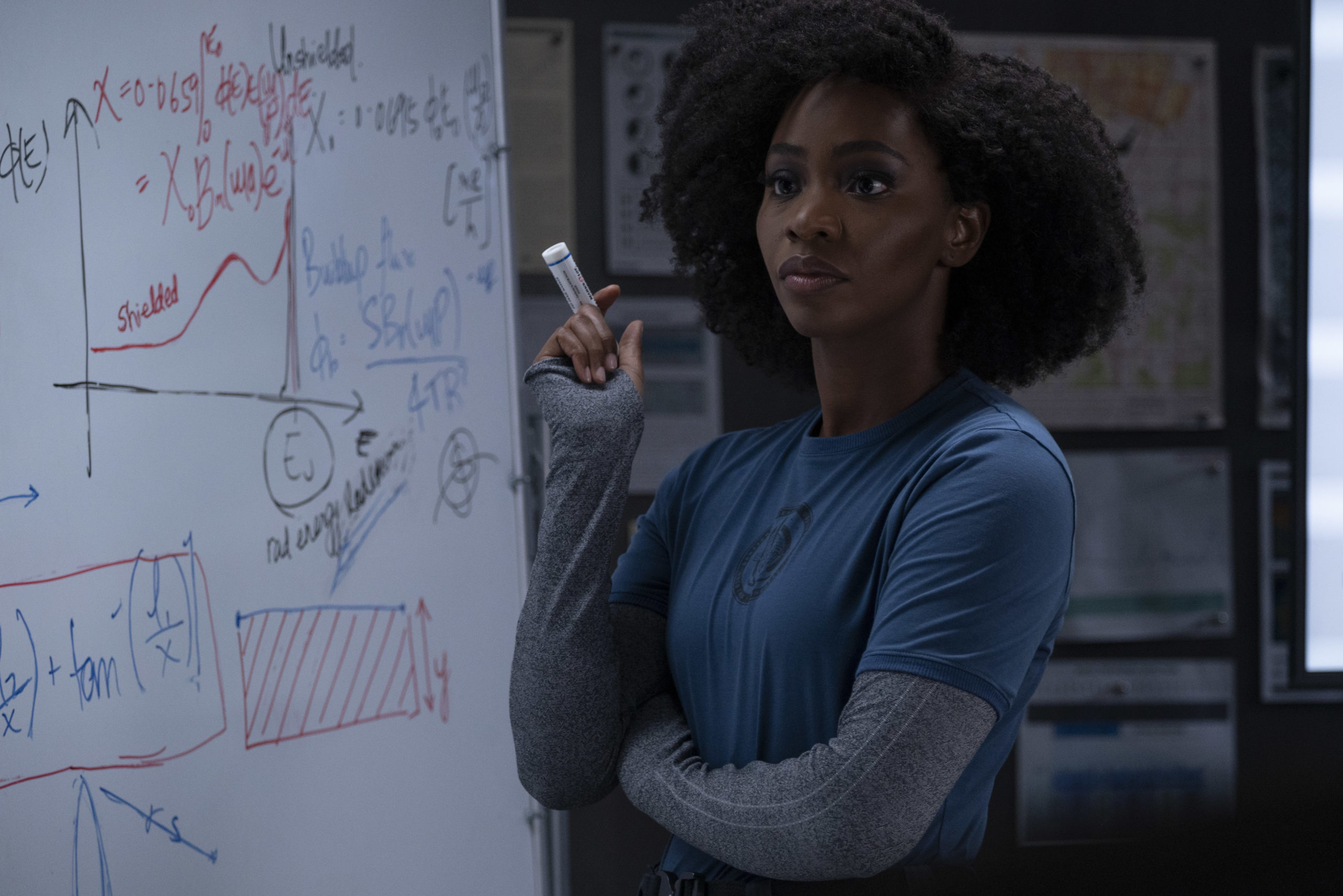
By taking issue with Hayward’s assessment, Monica not only asserts herself as an active participant in SWORD’s next steps, she also brings in most of the missing, important context about Wanda’s life that’s just as crucial to understanding what’s happening, even if it’s less quantifiable. As someone who has felt Wanda’s presence in her mind, Monica understands more than anyone else in the room what a violation it is. The way WandaVision cuts to a monitor where ‘70s “Geraldine” is busy bragging about her new corporate job feels like the show asking you to appreciate the bad optics of our “hero” imagining her only Black friend as jive-talking, comedic relief. The look on Monica’s face suggests that she’s sat with it and doesn’t care for it, but she also understands that there’s a possibility of Wanda truly not meaning to be destructive.
Though Hayward points out Wanda attacked her, Monica counters that Wanda’s likely the only reason she survived, and the hexagon’s existence suggests that she’s trying to contain her power to a certain extent. No one quite articulates that it seems strange that Wanda would suddenly turn evil after helping the Avengers save the world, but that does very much appear to be the case as Hayward shows his colleagues SWORD footage of the day Wanda stormed one of their facilities where Vision’s corpse was being held, before stealing the body and apparently bringing it back to life. It’s interesting to note that Wanda did something rather similar with the body of the original Human Torch, again, in Marvel Comics’ West Coast Avengers.
Even though one could make the argument that SWORD’s footage had been tampered with, the fact that Vision apparently left a will explicitly asking not to be revived if he were to die for fear of being weaponised casts an even darker shadow over WandaVision because of what it says about Wanda denying others their autonomy. Her willingness to hurt others in order to get what she wants pops up in a number of different ways back in Westview, where the now five-year-old twins are busy getting into simple mischief that gives her a reason to butt into their business. When their mum discovers that the boys have found a dog Agnes names Sparky (a nod to Tom King’s The Vision) that they want to keep, what ends up exasperating her is the way Vision takes issue with her openly using magic in front of Agnes, who for some reason doesn’t react to any of it.
[referenced id=”1668769″ url=”https://gizmodo.com.au/2021/02/wandavisions-first-major-mcu-connection-was-a-fascinating-moment-of-terror/” thumb=”https://gizmodo.com.au/wp-content/uploads/2021/02/02/ekkdao1nthkpawtlj0yz-300×169.png” title=”WandaVision’s First Major MCU Connection Was a Fascinating Moment of Terror” excerpt=”One of the things people crave most about Marvel’s cinematic output? Connection. Where is this character during this moment, how does this event connect to a hundred other narratives? WandaVision, Marvel Studios’ first crack at bringing its movieverse to streaming television, is no exception, but it’s doing so in a…”]
The harder Vision tries to get Wanda to pause and speak clearly with him about their charade, the more the show’s story pulls his attention away. But unlike WandaVision’s previous episodes where the shenanigans have become the sole focus of the story as a misdirect, when Billy and Tommy will themselves into 10-year-olds, you can see how the way Wanda’s now responding to things is only going to draw even more attention to her actions.
Back at SWORD, it’s Billy and Tommy that put Monica, Jimmy, and Darcy on a new line of thinking about the Hex, Darcy’s name for the Westview anomaly. Way back in Avengers: Age of Ultron, Maria Hill provided a brief description of Wanda’s power set that boiled down to telepathy and telekinesis. Post-Ultron, Wanda’s telepathic powers have been conspicuously absent from the MCU despite there being plenty of opportunities where they would have come in handy. What’s interesting about the way the Disney+ series reestablishes them is how the story highlights that while mind control is part of what’s happening, the shifts in Westview’s local reality are physical and not simple illusions.
The fact that Monica’s previous Geraldine costume retains its look from within the bubble despite still being made up of the same Kevlar material Monica was wearing means that, if Wanda isn’t outright bending reality, she’s at the very least rearranging matter on a molecular level on a very large scale. The scale of her power is part of why Captain Marvel’s alluded to briefly, as Jimmy and Darcy think about others who’ve been empowered by Infinity Stones and were also involved in the fight against Thanos. The mention of Carol gives Monica a noticeable pause suggesting that she has no desire to speak about her family friend for reasons that might have something to do with Carol having been missing from Earth for several decades.
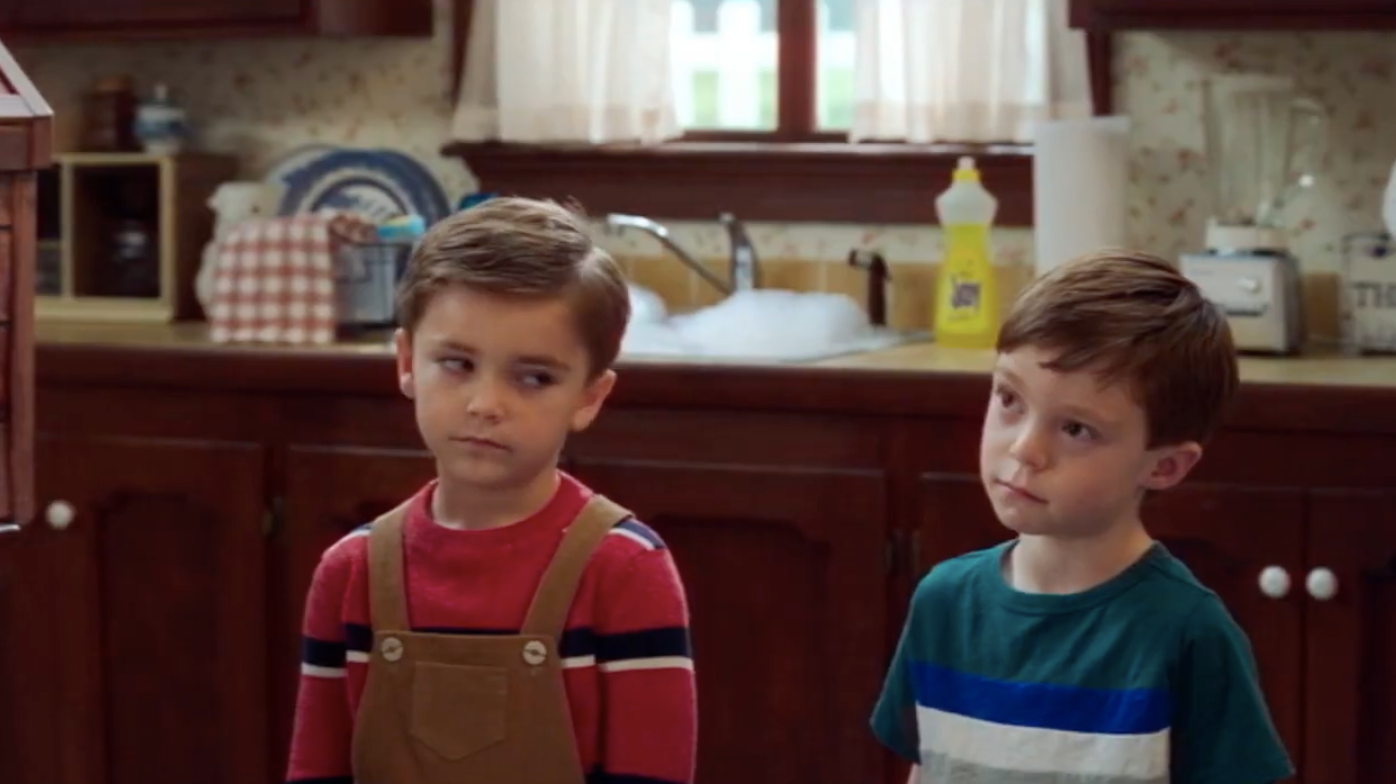
Much as Monica may not want to get close to talking about her personal life, her realisation about the Geraldine outfit leads to Darcy reasoning that the key to getting inside of Westview safely is to send something in that’s era-appropriate for whichever decade the show is currently in. An old SWORD drone successfully breaches the Hex just as Wanda’s sitting down with Billy and Tommy to have a conversation about why Vision’s at work on a weekend. When the boys correctly point out that it’s Saturday, not Monday, Wanda’s at a loss to come up with a believable explanation for her slip up, and it’s interesting that the boys have an awareness of time that WandaVision hasn’t shown others within Westview to possess.
In the same way that the in-universe show has helped Wanda avoid addressing reality when things go sideways around Vision, the same begins to happen with her, Tommy, and Billy as their talk becomes about how, even though parents may fight sometimes, they always love their children, and the love that exists within families is eternal. The more Wanda and the boys talk to one another, though, she begins to say more about the family she had before them and she tells the twins how losing Pietro still makes her sad because of how deeply she loved him.
“On This Very Special Episode” inverts the way WandaVision uses fiction to distract from reality as SWORD’s drone beelines its way to Wanda’s location. When Wanda steps out onto the footpath after sensing the intrusion, a glowing glare at the SWORD drone is all it takes for Hayward to order his team to launch a missile that Monica was not informed about at Wanda, and the SWORD agents are unsure whether their strike was successful as their feed into Westview goes dead. Interesting as the MCU’s Wanda has been, most of her previous appearances have all shied away from the theatricality that defines the Scarlet Witch’s presence in Marvel’s comics — but that’s finally on display here.
When SWORD detects something happening within the Hex, the agents mobilise immediately and post up with their guns readied to fire at whatever emerges from it. Rather than burst her way out of the bubble, Wanda wrenches it open with her mind, and the gathered agents are alarmed to see her dragging the broken drone behind her with a single hand for dramatic effect.
After years of Wanda’s Sokovian accent waning and then fully disappearing as WandaVision began, it comes back in full force here as Wanda stares SWORD down and tosses the drone to let everyone gathered know that she’s not above destroying them if they don’t leave her alone. Despite how everything she’s doing looks, Monica still believes she can connect with some part of the woman because of the bond they formed (and because Wanda can see into people’s minds). It doesn’t quite work though because, as Wanda explains, SWORD has nothing to offer her because everything she wants already exists within the Hex.
Wanda’s dramatic turn back into Westview ends with her forcing the SWORD agents to train their guns on Hayward, and it’s clear Monica’s sitting with the idea of Wanda retreating back into the Hex to get back to what she wants and fears SWORD will try to take away from her. What Wanda wants is the comfort and normality that the mum from the Lagos paper towel commercial has; She wants the silly, existential minutiae that comes with living in a half-hour sitcom, like helping your kids search the neighbourhood for the lost dog they convinced you to let them keep.
Sparky’s sudden death is mildly sad in the way that all of these specific kinds of special episodes almost always are, and while Wanda sees it as a chance to help Billy and Tommy come to understand grief, the boys immediately share a look with one another knowing that they can age themselves up again to fast forward through the pain.
Again, the degree of autonomy Billy and Tommy possess is strange, as is Agnes being totally unfazed by their conversation as Wanda explicitly tells them not to use their powers, and the boys reveal that they know she can probably bring Sparky back from the dead. Wanda’s insistence that some things like death are permanent is her being the most open yet about the pain that she’s feeling, even though she’s not necessarily talking to people directly. Those ideas are still being beamed out of the Hex, but before WandaVision lets its show head down that track, things begin to fall apart in major ways that are going to be very important as the series continues.
When Vision arrives on the scene to interrupt the resurrection conversation and comfort his sons, WandaVision’s show cuts to later in the day, back in their home where Vision’s yet to tell Wanda about how he spent his day. Like Billy and Tommy, Vision innately understood that his being at the office on a Saturday was wrong, and his hunch became unignorable once a SWORD email made its way to the computers in his office and all of the human employees began reciting its contents about the high levels of radiation on the Hex’s perimeter. This is what prompted Vision to really “wake up,” as he touches his colleague Norm’s (Abilash Tandon) temples and seemingly breaks the man free of Wanda’s influence before having to put him back under to prevent the poor man from panicking.
Vision brings all of that knowledge home with him in the evening as he prepares to finally lay the cards on the table and force Wanda to admit what she’s doing. But when he tells Wanda about Norm, she tries to dismiss him by literally cueing the theme song and starting the in-universe credits as she leaves the kitchen.
Where other episodes have played fast and loose with how in control Vision is of his actions, the way he approaches Wanda here establishes that while he’s aware of everything that’s happened in Westview, he has no recall at all of his life before it ended with the Mind Stone being ripped from his head. Vision’s being honest when he tells Wanda that he’s scared, and it’s implied that part of what he’s afraid of is her because all signs point to her being the source of the Hex’s troubles. Olsen and Bettany have had consistently captivating chemistry all throughout the series as people ridiculously enamoured with one another, but the edge to their performances as the couple almost come to blows and float into the air injects an unexpected dose of Who’s Afraid of Virginia Woolf to WandaVision that works.
Manipulative as the series has made Wanda out to be, though, at the moment when she tells Vision that she doesn’t really know how the Hex began or how to control every last detail of what’s going on, WandaVision’s reminding you that there are still four episodes left, and obvious answers aren’t always the correct ones.
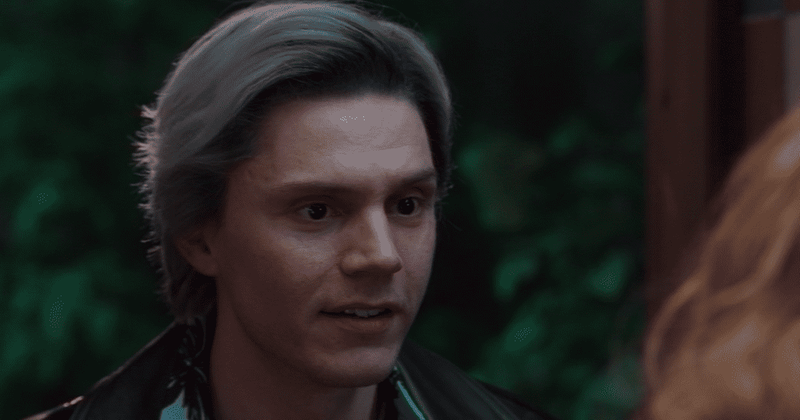
When the doorbell rings, Vision can’t help but interpret it as another of Wanda’s tricks trying to distract them, and he very may well be right, but the person standing at Wanda’s door seems to genuinely stun her. In what can currently be best described as a very cheeky wink at corporate mergers and intellectual property rights, the version of Pietro standing on Wanda’s doorstep is portrayed by Evan Peters, whose version of Quicksilver from Fox’s X-Men movies outshined and outlived Aaron Taylor-Johnson’s athleisurewear enthusiast Pietro who appeared in Avengers: Age of Ultron.
WandaVision acknowledges this gag by way of Darcy, who wonders how and why Wanda would recast her dead brother even though that’s a very network TV sort of thing to do. Between the new, dirtbag uncle Pietro who’s arrived in Westview, mentions of radiation, and the tiny nod to Charles Darwin that comes at this episode’s very beginning, there’s going to be an understandable amount of chatter about whether WandaVision is setting up the beginnings of mutants coming to the Marvel Cinematic Universe. WandaVision’s encouraged that sort of speculation by literally having a number of its characters work out fan theories on screen and come just shy of winking at the camera to say “See what we did there?”
That being said, Peters’ casting could, for now, just be a joke, or perhaps a set up for a future joke in which he is swapped out for Taylor-Johnson, because…well, WandaVision’s always poking through the fourth wall of its own televised existence. Either way, now that uncle Pietro’s in town, Westview’s definitely going to become a more complicated place if only for the fact that now, when Wanda makes her way to the ‘90s, there’s an iconic catchphrase about culpability she has no business saying.
